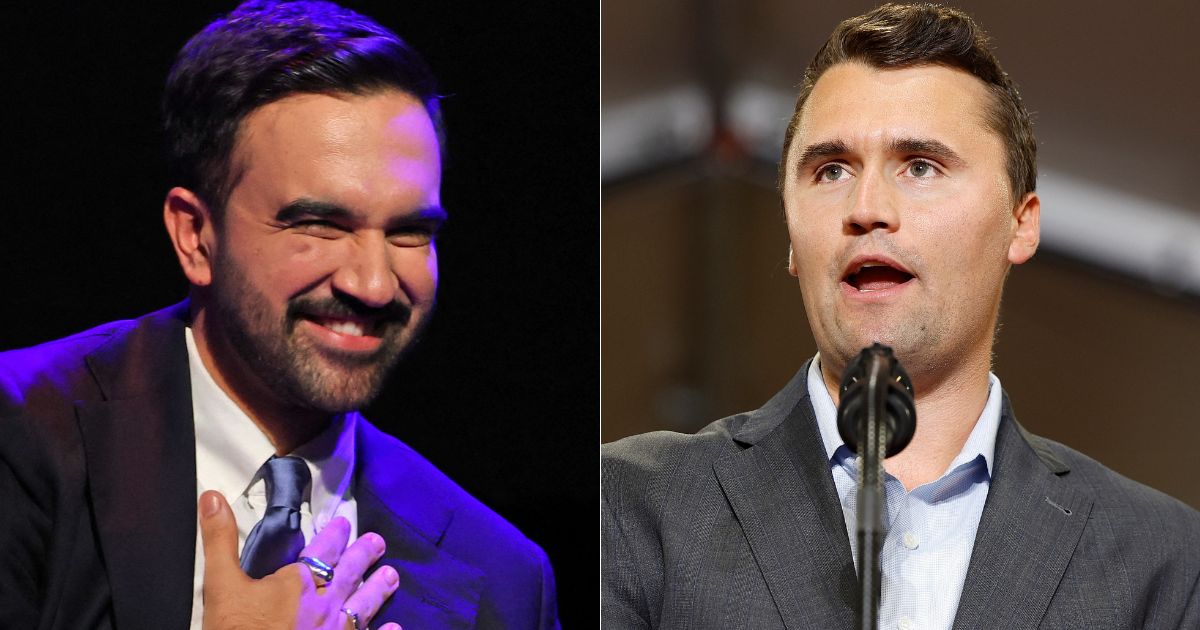The socialist surge in New York City has rattled conservatives across the nation. Tuesday’s historic victory by Zohran Mamdani — the city’s first Muslim mayor and a democratic socialist — is being framed not as a standalone upset, but as a symptom of a generational and economic disconnect that Republicans have long ignored.
Among those sounding the alarm is Charlie Kirk, the conservative activist and founder of Turning Point USA, whose recent comments on younger Americans’ political vulnerabilities have gone viral in the wake of the election.
For older conservatives still clinging to Cold War-era platitudes, Kirk’s message may be uncomfortable: the battle for hearts and minds cannot rely solely on abstract warnings about Marxism, socialism, or the supposed evils of communism.
Kirk Channels a Modern-Day MLK Moment
Less than two months before the election, Kirk sat down for a wide-ranging discussion with Tucker Carlson on July 21 — a conversation that now feels eerily prescient.
In a post accompanying a video of the nearly two-hour exchange, Kirk wrote:
“If we don’t improve the economic condition of young Americans, Mamdani and the destructive ideas he espouses will continue to spread.”
Kirk’s point was simple: the radicalism sweeping cities like New York is not a mystery. It thrives in an environment where young people feel economically trapped, socially isolated, and politically powerless.
He continued by highlighting the mechanisms that got Donald Trump elected in 2024: giving younger voters a tangible stake in their future.
“When young people have faith in their own economic future, when they own homes, and when they get married and have children, they have a stake in the country. They have skin in the game. Perpetually single, childless renters are easier to radicalize by those who want to destroy Western Civilization.”
The analysis was stark — but, in the eyes of Trump supporters on social media, accurate.
A Bold Prescription
Kirk didn’t stop at diagnosis. He proposed a radical, almost audacious solution:
“We need a moon shot, Manhattan Project-style. 10 million new homes in 3 years; 20 million deportations and self-deportations; Reform and reduce legal immigration.”
The statement, unsurprisingly, sparked debate. Critics dismissed it as extreme. Supporters hailed it as a blueprint for reclaiming the American Dream for younger generations.
After Mamdani’s win, the viral conversation from July became a focal point on X, with Trump supporters pointing out that Kirk had identified the underlying challenge long before it manifested at the ballot box.
Did Republican Missteps Fuel the Loss?
The election also reopened debates about GOP priorities. Some Trump supporters argue that the party’s obsession with foreign policy and Cold War-era rhetoric has left domestic concerns unaddressed.
Filmmaker Mike Cernovich summarized the sentiment on X:
“Trump spent all year on the Middle East, his big donors loved this, the voters did not. Virginia is going to be under a Democrat super majority now. Keep listening to Mark Levin, Mr President, and you’ll be back to impeachment trials in 2026.”
The critique is clear: young Americans are more motivated by economic prospects than by abstract geopolitical talking points.
Dr. King’s Forgotten Lesson
Kirk’s warnings, however, are not new in principle. Nearly six decades ago, Dr. Martin Luther King Jr. delivered a sermon with strikingly similar undertones.
In 1962, King preached “Can a Christian Be a Communist?”, concluding that, of course, a Christian could not. But he went further, noting that the allure of socialism often stemmed from systemic failures in society and Christianity itself.
“Indeed, it may be that communism is a necessary corrective for a Christianity that has been all too passive and a democracy that has been all too inert,” King said, highlighting the need for tangible change in the here and now — not just platitudes about the hereafter.
King thundered:
“Oh, I tell you this morning, and I believe in immortality. I believe in it firmly and absolutely. But I’m tired of people telling me about the hereafter and they don’t tell me about the here. You can’t say hereafter without saying here. It’s all right to talk about silver slippers in a symbolic sense over in heaven, but give me some shoes to wear down here. It’s all right to talk about long white robes over yonder, but give me some clothes to wear down here.”
For conservatives analyzing the rise of Mamdani, King’s sermon is a reminder: addressing social and economic reality is essential to halting radicalization.
Trump, Kirk, and the MAGA Playbook
For those wondering how the MAGA movement fits into this analysis, the answer is simple: it was built around solutions that give younger Americans tangible stakes in their country.
-
Home ownership
-
Marriage and family stability
-
Economic opportunity
By failing to address these, conservatives risk allowing figures like Mamdani to continue gaining traction among voters disillusioned with the system.
Kirk, in effect, has been issuing a warning: without serious policy action, New York’s mayoral upset may be a harbinger for future contests.
The Bigger Picture
Mamdani’s victory is part of a broader pattern of progressive successes in urban centers across the U.S., reflecting shifting demographics and economic frustrations.
Republicans, Kirk and Trump supporters argue, must pivot away from Cold War-era rhetoric and toward solutions that meet voters’ real-world needs — or risk watching socialist influence expand unchecked.
The lesson is clear: young voters are not motivated by nostalgia or ideological purity. They are motivated by opportunity, security, and a sense of belonging.
Will Republicans Learn in Time?
As the dust settles in New York, the question for the GOP is stark: will they adapt to the reality of younger Americans’ needs, or continue relying on tired slogans about communism and capitalism?
The voices of Charlie Kirk and Dr. King provide an unlikely but united message: address the here, or lose the hereafter politically.
For now, Mamdani’s victory stands as both a cautionary tale and a call to action for conservatives seeking to reclaim relevance with the next generation.

Emily Johnson is a critically acclaimed essayist and novelist known for her thought-provoking works centered on feminism, women’s rights, and modern relationships. Born and raised in Portland, Oregon, Emily grew up with a deep love of books, often spending her afternoons at her local library. She went on to study literature and gender studies at UCLA, where she became deeply involved in activism and began publishing essays in campus journals. Her debut essay collection, Voices Unbound, struck a chord with readers nationwide for its fearless exploration of gender dynamics, identity, and the challenges faced by women in contemporary society. Emily later transitioned into fiction, writing novels that balance compelling storytelling with social commentary. Her protagonists are often strong, multidimensional women navigating love, ambition, and the struggles of everyday life, making her a favorite among readers who crave authentic, relatable narratives. Critics praise her ability to merge personal intimacy with universal themes. Off the page, Emily is an advocate for women in publishing, leading workshops that encourage young female writers to embrace their voices. She lives in Seattle with her partner and two rescue cats, where she continues to write, teach, and inspire a new generation of storytellers.









